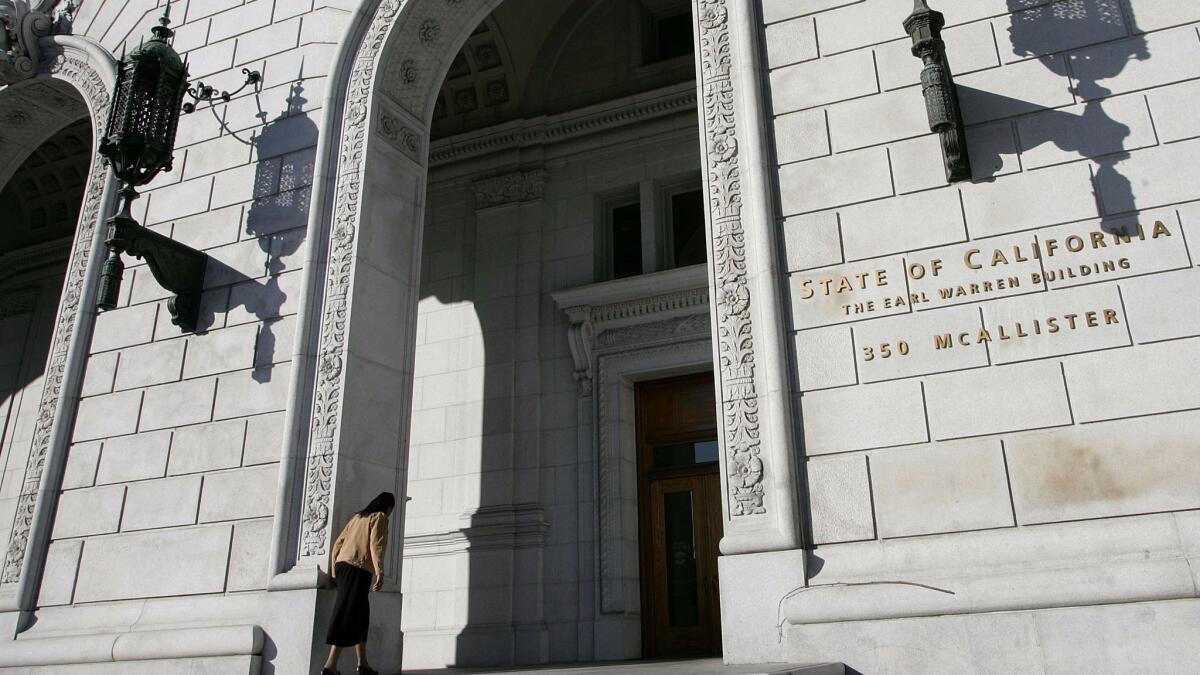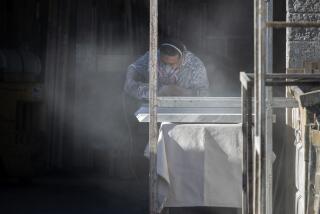Companies can be held liable when workers bring home asbestos dust that sickens others, court rules

- Share via
Companies may be held liable if asbestos from a job site causes someone in a worker’s home to become sick, the California Supreme Court decided unanimously Thursday.
The state high court ruling allows lawsuits to go forward on behalf of people allegedly diseased by asbestos fibers brought into the home on another person’s clothing.
“Employers have a duty to take reasonable care” to prevent workers from carrying home asbestos on their clothing or other personal effects, Justice Goodwin Liu wrote for the court.
Under the decision, only members of a worker’s household may sue for harm caused by secondary exposure.
“To be sure, there are other persons who may have reason to believe they were exposed to significant quantities of asbestos by repeatedly spending time in an enclosed space with an asbestos worker — for example, a regular carpool companion,” Liu wrote.
But he said the rule would limit litigation and protect “an identifiable category of people … most likely to have suffered a legitimate, compensable harm.”
Though the commercial use of asbestos began to be phased out decades ago, lawsuits alleging that it caused disease remain abundant.
The product was widely used in building materials — as well as in hair dryers and automobile brakes. Lawyers who represent people who claim asbestos caused their disease say construction workers and others may continue to be exposed.
The ruling stemmed from two lawsuits.
One was brought by Johnny Blaine Kesner Jr., who was diagnosed with perotineal mesothelioma in February 2011 and died at the age of 53 in 2014.
He sued Pneumo Abex LLC, which owned a brake manufacturing plant in Virginia that employed his uncle.
Kesner spent at least three nights a week at his uncle’s home from 1973 to 1979, and the uncle said he sometimes slept near Kesner or roughhoused with him while wearing work clothes.
The other suit was filed by the children of Lynne Haver, who was diagnosed with mesothelioma in March 2008 and died in April 2009. Their suit alleged that the mother was exposed to asbestos from her former husband’s clothing.
Haver’s husband worked for the Atchison, Topeka and Santa Fe Railway, a predecessor of BNSF Railway Co., from July 1972 through 1974 and was exposed to asbestos from pipe insulation and other products, the suit said.
Mesothelioma is a cancer of the chest and abdomen closely linked to asbestos exposure. Victims may be exposed by inhaling or ingesting microscopic asbestos fibers in the air.
Ted W. Pelletier, who represented Kesner, said companies knew of the dangers of asbestos for decades but failed to provide locker rooms or showers for workers.
Monday’s decision means “wives and children and husbands who were needlessly and preventably poisoned can seek justice,” Pelletier said.
The ruling was significant, he said, because it ended a legal bar on lawsuits from people exposed outside a workplace.
Lisa Perrochet, who represented the employer in the Kerner case, said the ruling was likely to spark more lawsuits.
“This is a departure from what a majority of other states do,” she said.
maura.dolan@latimes.com
More to Read
Sign up for Essential California
The most important California stories and recommendations in your inbox every morning.
You may occasionally receive promotional content from the Los Angeles Times.














